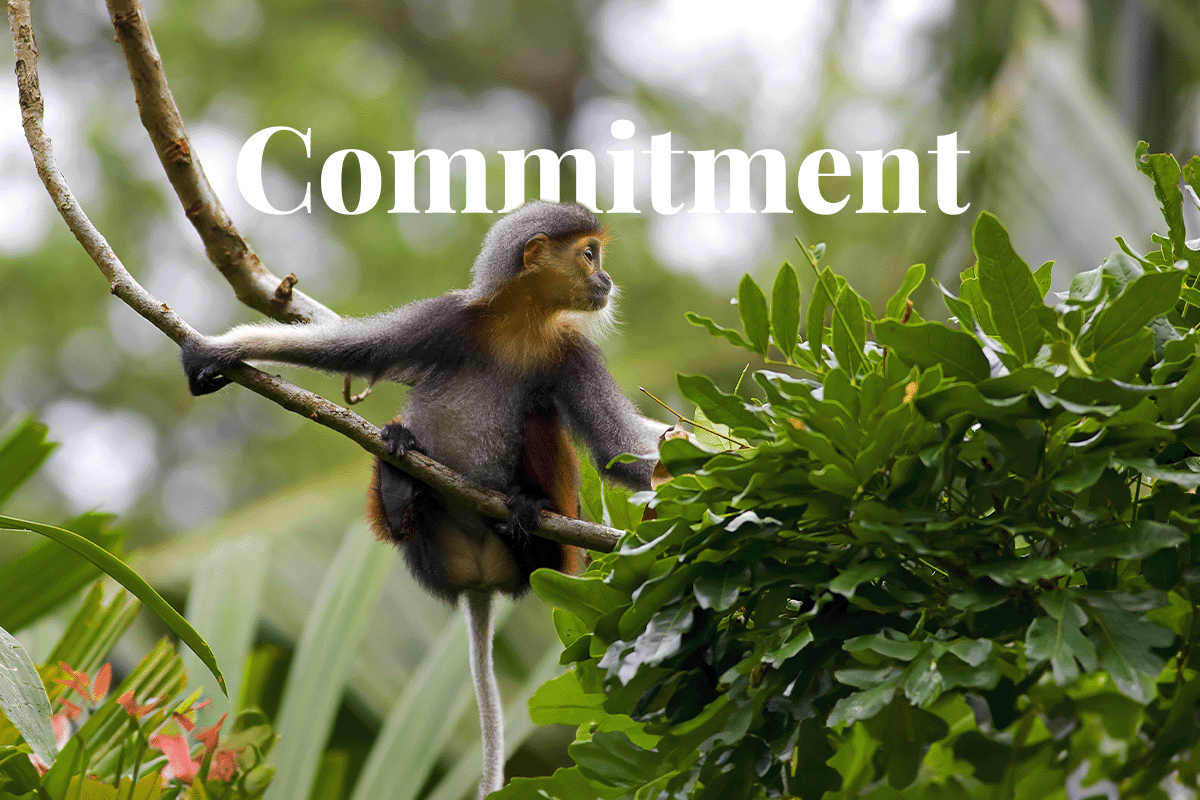Despite the challenges in safeguarding natural forests, Cambodia's Ministry of Environment remains confident in its ability to sell carbon credits for socio-economic development. During a recent training session on climate change and REDD+ (Reducing Emissions from Deforestation and Forest Degradation) in Cambodia, Choup Paris, an Undersecretary of State of the Environment Ministry, expressed the country's commitment to achieving carbon neutrality.
 Red-shanked Douc sitting on a tree in a forest in Cambodia.
Red-shanked Douc sitting on a tree in a forest in Cambodia.
Under the support of Wildlife Alliance (WA), a non-profit organisation focused on forest and wildlife conservation, the media trip aimed to educate local journalists. The REDD+ Programme is an initiative aligned with the United Nations that seeks to preserve biodiversity and create alternative livelihoods.
Paris emphasised the government's dedication to managing natural resources and protecting the environment, particularly by safeguarding natural forests, which play a crucial role in preserving the planet's ecosystems. Cambodia actively participates in global efforts to combat environmental issues, reduce greenhouse gas emissions, and pursue national goals for society and the environment.
Read more: Net zero: benefits, challenges, strategies, and the power of nature-based solutions
Cambodia's efforts in managing and conserving protected areas have resulted in the renewal of its carbon credit agreement in the coming years. Notably, the sale of carbon credits from Keo Seima Wildlife Sanctuary (KSWS), Tatai Wildlife Sanctuary, and Southern Cardamom National Park secured $11.6 million between 2016 and 2020, according to the Ministry of Environment's data.
The transition from a logging nation to one that generates income through selling carbon credits signifies Cambodia's shift towards sustainability. The United Nations Framework Convention on Climate Change encourages countries to protect their forests and raise funds by selling carbon credits.
The Kingdom continues to explore opportunities to sell additional carbon credits from various wildlife sanctuaries and natural heritage parks. At the 26th UN Climate Change Conference (COP26) in 2021, Cambodia submitted an updated Nationally Determined Contribution (NDC) report with a target to reduce emissions by 42% by 2030.
Read more: Southeast Asia's $200 billion restoration imperative
Furthermore, Cambodia is developing a long-term carbon-neutral development strategy to promote low-carbon activities, climate resilience, and environmental progress. The government is committed to protecting natural resources and aims to reduce greenhouse gas emissions by 64.6 million tonnes of carbon dioxide in the forestry and energy sectors by 2030.
Undersecretary of State Paris called for collaboration between the government, local communities, and partners to safeguard forests, holding developed countries accountable for causing climate change. Ken Serey Ratha, director-general of the Ministry of Environment's General Department of Environmental Knowledge and Information, highlighted the meticulous assessment of carbon production capacity and other mechanisms prior to obtaining carbon credits.
The decision of companies to purchase carbon credits from Cambodia demonstrates the country's effective protection and management of forest-rich protected areas.
The identification of 43 new sites for carbon credit supply by the United States Agency for International Development (USAID) Greening Prey Lang and the Ministry of Environment in 2021 is expected to generate additional income for Cambodia. These initiatives will reduce carbon emissions, support the Paris Climate Agreement, and enhance forest and wildlife conservation while benefiting community livelihoods and resilience.
Hun Marady, Director of Koh Kong Provincial Department of Environment, acknowledged that the REDD+ framework had provided global funding to support forest conservation in the Cardamom Protected Forest and other protected areas in Koh Kong Province. The project also contributes to the sustainable development of local communities by providing clean water systems and improving local infrastructure.
Khvay Atitya, another Undersecretary of State of the Ministry of Environment, highlighted the importance of environmental awareness programmes for journalists to strengthen their capacity to disseminate environmental information, understand natural resource management, biodiversity conservation, and sustainable livelihoods for local communities.
It is paramount that governments realise the significance that carbon projects can have on reaching their sustainability goals and safeguarding the environment. Carbon markets are essential for achieving our climate goals. They provide a powerful incentive for governments and businesses to invest in sustainable practices and witness the benefits of a thriving natural environment first-hand. DGB Group firmly advocates for the power of nature-based solutions as the most effective approach to safeguarding and revitalising our natural environment. We believe the power to make a positive impact lies in our hands. Join us on this transformative journey. Together, let's support nature in the most accessible and transparent way possible.
Contact our experts to take the first step today

